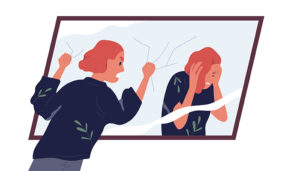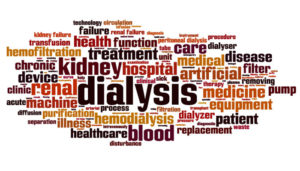Care Connections Newsletter
helpful tips for family caregivers
August/September 2021
In our first article we look at self-forgiveness: gleaning important life lessons and moving forward positively to address the next set of caregiving challenges. In our middle article we look at daily money managers. Are you noticing piles of unopened mail? Utility shut-off notices? It could be that managing basic finances has become too much for the person you care for. Perhaps they need a daily money manager—someone to come out twice a month, making sure everything is getting paid as it should be and reducing any duplicate payments. Last, we complete our series on kidney disease by addressing issues that arise when a loved one decides they no longer want to continue with dialysis. (About 25% of people on dialysis eventually decide to stop.)
Learning to forgive yourself
 According to psychologist Rick Hanson, PhD, we all have an inner critic and an inner protector. Together they help us maintain a balanced perspective. But too often as family caregivers, we have an overload of guilt, shame, and remorse, always feeling our performance is subpar. This is not healthy. The inner critic has an important role, but it’s not to pulverize our self-esteem.
According to psychologist Rick Hanson, PhD, we all have an inner critic and an inner protector. Together they help us maintain a balanced perspective. But too often as family caregivers, we have an overload of guilt, shame, and remorse, always feeling our performance is subpar. This is not healthy. The inner critic has an important role, but it’s not to pulverize our self-esteem.
We all make mistakes. The goal is to use our inner voice to acknowledge errors, learn what we can, and move on—leaving personal scorn out of the equation. Consider this process for reviewing your mistakes:
- List your positive qualities. This is not self-flattery. This is calling in your protector to provide balance. What do you know in your gut others would say about you? Perhaps there are past actions that reflect your most stellar self. Take a minute to fully recall these attributes.
- Honestly assess the damage. List what occurred, factually. Then list your intentions. Then the results. Report the incident as a journalist might. If guilt tries to hijack you emotionally, make the shift from “I’m a terrible person”—attacking your character—to “That was not a wise decision.”
- What can you learn from this? Hanson suggests you sort your actions into three categories: Moral faults, simple unskillfulness, and everything else. For actions in the first two categories, make two lists:
- “I am responsible for … .” Clearly, things you did or said. Give yourself a moment to let this sink in, not beat yourself up. But honestly own it. Neurologically, this helps “wire in” the learning.
- “I am not responsible for … .” Another person’s action, emotional reaction, or misinterpretation of your intent. Pause. Allow any feelings of relief to settle in.
- Take action. Have you already begun to make amends? What more can you do to address the parts you are responsible for?
- Forgive yourself. When you have done what you can, look at the situation as if you were talking to a friend. At some point, once your friend has made the possible repairs and gleaned any life lessons, you would advise them to let go and move on. Give yourself that kindness as well.
What is a daily money manager?
 A financial advisor manages investments. A daily money manager (DMM) is someone who comes to the home once or twice a month to handle the mundane aspects of personal finances: Paying monthly bills (but your loved one signs the checks). Balancing the checkbook. Navigating health insurance claims. Resolving billing errors. Tracking donations. Organizing paperwork. Gathering documents for tax time. Their job is to catch unnecessary expenses while making sure important payments are made on time.
A financial advisor manages investments. A daily money manager (DMM) is someone who comes to the home once or twice a month to handle the mundane aspects of personal finances: Paying monthly bills (but your loved one signs the checks). Balancing the checkbook. Navigating health insurance claims. Resolving billing errors. Tracking donations. Organizing paperwork. Gathering documents for tax time. Their job is to catch unnecessary expenses while making sure important payments are made on time.
When to call in a DMM. If you are seeing piles of unopened envelopes or shut-off notices, that’s a sure sign extra help is needed. Many families bring in a DMM when the spouse who typically handled the finances dies, as the remaining spouse may find getting up to speed just too overwhelming. Or consider a DMM if your loved one needs help but no one in the family lives close by or has the necessary time or temperament. Conversely, there may be a person who seems a little too interested. The oversight of a DMM can deter a relative or “friend” from taking financial advantage.
Benefits. A DMM can help your loved one continue to live independently and still feel in control. They check for duplicate billings and missed payments. (You don’t want the insurance cancelled!) They can identify cost-cutting measures. For example, trim the cable plan or negotiate a phone plan that better fits actual usage. A DMM can catch unexplained charges on a credit card. Plus, they get to know your relative and can alert you if they notice problems, such as drowsiness or slurred speech. Perhaps bruising from a fall.
To find a DMM. Go to the American Association of Daily Money Managers (aadmm.com). Ask about training, background checks, and professional insurance. And certainly, check on references.
Return to topThe decision to stop dialysis
 Dialysis is life sustaining yet also quite taxing for the patient. About 25% of people who choose dialysis later decide to stop. Typically, this is because the burdens of this kidney disease treatment have severely reduced their quality of life. The tradeoff becomes no longer acceptable.
Dialysis is life sustaining yet also quite taxing for the patient. About 25% of people who choose dialysis later decide to stop. Typically, this is because the burdens of this kidney disease treatment have severely reduced their quality of life. The tradeoff becomes no longer acceptable.
Ending dialysis is essentially a decision to let nature take its course. It means that death will follow in the near future. Patients make this choice to regain control of their life, even if only for a short while. This doesn’t end their being under a doctor’s care, but regular treatments and lab tests are no longer required. They can stop many medications, remove the access port, and eat a more enjoyable diet. Generally, they then have weeks of time to spend with family and friends—before growing weaker and sleepier, until they die.
Dying from kidney disease is typically peaceful and pain free. The discomforts can be managed. Most people choose hospice care. This includes weekly visits from a nurse and visits by a home health aide to assist with bathing. Social worker and chaplain services are also available.
If your loved one wants to stop dialysis, have them talk first with their health care provider. The dialysis team will want to know the reason. They may be able to adjust the treatment to ease difficulties.
If your relative remains resolved to quit, death is certain. They must have all affairs in order before stopping dialysis. This includes financial paperwork such as a will or trust, and a durable power of attorney. Also, a completed advance directive that names a health care decision maker and outlines treatments they do or don’t want when the end is near.
Rather than focus on shortened life, as a family take this time to express your love for each other. Enjoy the time you have left to make pleasant memories.
Return to top